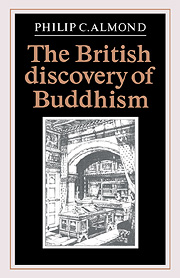Book contents
Conclusion
Published online by Cambridge University Press: 02 December 2009
Summary
The varying Victorian evaluations of Buddhism which I examined in the previous chapter are of particular interest, and for at least two reasons. In the first place, they give us a much richer picture of the development during the nineteenth century of a secularist and pluralist understanding of religion, and in particular of Christianity as one religious tradition among many. Broadly speaking, during the Victorian period, there developed the assumption that human nature is essentially secular, and therefore, that religions – Christianity, Buddhism, Islam, Hinduism – are essentially opposing addenda, the value and truth of each of which merit analysis and argument.
But, in the second place, that there were such varying evaluations of Buddhism is of interest in the light of the fact that, as I have tried to suggest, at the beginning of the nineteenth century the Buddhist tradition did not exist as an object of discourse in the West. In the Western imagination, Buddhism is the most recent of the major world religions, its construction and interpretation reaching back a mere century and a half.
Above all, as I have argued, Buddhism was reified as a textual object. By the middle of the Victorian period, Buddhism was seen as essentially constituted by its textuality, and it was the Buddhism thus constructed and thus interpreted that was the criterion against which its manifestations in the ‘Orient’ were measured, and generally, as we have seen, found wanting. A crucial product of this process of the textualization of Buddhism was the emergence of the historical Buddha. By the middle of the Victorian period, the Buddha had emerged from the wings of myth and entered the historical stage.
- Type
- Chapter
- Information
- The British Discovery of Buddhism , pp. 139 - 141Publisher: Cambridge University PressPrint publication year: 1988

